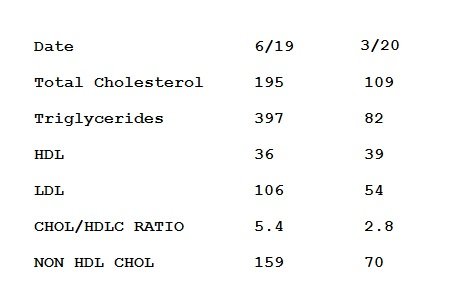What I have found is quite complicated. To me, the starting data is "what particle size or weight lipid does the liver pump into your blood?"
Yes, it is complicated. I don't pretend to know everything. I do know that LDL-C, which is what most basic lab work measures, cannot answer that question. It's also just an estimate.
I remember reading in Gary Taubes' book (Good Calories, Bad Calories) that there are about half a dozen different types of LDL particles. He has a good chapter on that issue, if you haven't read it yet. The book was written a while ago, so we know more now, but even at the time Taubes was writing, it was clear that simply measuring LDL-C did not tell you a whole lot.
Other physicians and engineers I've listened to over the years have talked about the difference between glycated or oxidized LDL vs. non-glycated or non-oxidized LDL, with the former being the type associated with damage. So the trick is to avoid oxidation or glycation, which generally means avoiding environmental toxins, vegetable oils, and sugar. The message I came away with was that LDL itself was okay, but if you have a toxic soup of sugar and processed food stuff it's swimming around in, it gets nasty. It's the environment the LDL is in, not the LDL itself, that is the problem.
The actual association between LDL and heart disease is a pretty small one, and it's an associative link, not a causal one.
The whole label of "bad cholesterol" is insane. LDL is something our body naturally produces -- it's not something that is going to kill us. It's there for a reason and a purpose. It's the metabolic soup it's swimming around in that is the problem. Dave Feldman, an engineer who's done a lot of work in this area, refers to LDL as like an ambulance at the scene of an accident. It's not the cause of the accident; it's just at the scene, trying to help.
Here are a couple brief, pop-level Youtube videos on the subject. I won't claim these guys are unimpeachable experts -- Berg is a chiropractor and Lauer likes to take his shirt off a lot -- but they may be worth a watch. I saved them when I was a bit anxious myself, a couple years ago, when my LDL increased after going on a low-carb diet.
Here's something a bit more academic:
LDL-C does not cause cardiovascular disease: a comprehensive review of the current literature
https://www.tandfonline.com/doi/full/10.1080/17512433.2018.1519391
Also, check out Taubes' chapter on the subject of LDL in Good Calories, Bad Calories, if you have the time.
I went to a doc because I wanted a blood test. Told him I'm doing Keto. Told him I'm not fasted. They called back and said your lipids are really high, we want to prescribe a cholesterol lowering drug.
Complete idiots.
Trouble is, they pass this crap data to my insurance company, who will "flag" me.
Hypercholesterolemia! Sinner! Thou shalt take a statin to be cleansed of thy sin. What a racket.
They don't even understand that a lipid test needs to be fasting? Ur...

